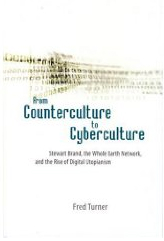13 October 02009
Counterculture, Cyberculture and Innovation: the strange case of Stewart Brand
 A couple of years ago, at the end of this post on the crossover between Web 2.0 and anarchism, I wrote that I'd started reading Fred Turner's From Counterculture to Cyberculture: Stewart Brand, the Whole Earth Network and the Rise of Digital Utopianism
A couple of years ago, at the end of this post on the crossover between Web 2.0 and anarchism, I wrote that I'd started reading Fred Turner's From Counterculture to Cyberculture: Stewart Brand, the Whole Earth Network and the Rise of Digital Utopianism, and suggested I might be blogging about some of the ideas in it. Time passed; I soon forgot the ideas the book had triggered; things moved on. Then, when Nico Macdonald told me the book was up for discussion at his Innovation Reading Circle, that gave me a reason to re-engage with the book. Nico already had Joanne Jacobs lined up to give an introduction to the book, but kindly created a support slot for me to give a response to Joanne's critique. What follows is that response, plus some brief and partial notes of the discussion that followed at the Reading Circle last night.
It makes sense to read Joanne's review in full first. To try and summarise it in a nutshell, Joanne is saying that Turner's radically overstates the countercultural significance of Stewart Brand and his circle of tech-visionary associates — much of their work and ideas actually has more in common with the dominant culture than with anything genuinely subversive. And to summarise my response in a nutshell, I ask, "So what if they weren't and aren't revolutionaries? Does it take anything away from their importance?" Then I try and answer the So What question in my own way. That's enough prefacing; on with the show.
1 Counterculture? What counterculture?
1.1 Counter to what?
I'm not convinced that Fred Turner is making any claims for Brand and his associates as revolutionaries. The book is called "from Counterculture to Cyberculture" and its main narrative is one of how a bunch of ideas from the fringes of society became mainstream — through the agency or the catalyst of Brand and his eco-filofax of contacts. It's the same narrative of innovation — corporate enterprises being prepared to think out of the box to be creative and competitive — that has become orthodoxy in many circles not too far from here.
This idea of boundary objects that "both inhabit several intersecting social worlds and satisfy the informational requirements of each" has been around for a while, and I think Turner's application to Brand's story is at least plausible.
Continue reading "Counterculture, Cyberculture and Innovation: the strange case of Stewart Brand"
Subscribe to my RSS feed, which covers this blog, my book blog, and further commentary on other web resources (more feeds below)
Cinema (24)
Cultural Calendar (86)
Curatorial (66)
E-learning (102)
Events (35)
Future of Music (95)
Human-Computer Interaction (62)
Ideas and Essays (37)
Long Now (18)
Miscellany (44)
Music and Multimedia (157)
Playlists (27)
Podcasting (12)
Politics (12)
Radio (48)
Reviews (58)
Social Software (60)
Teaching (23)
Alternatively, see the Date-based Archives
Recommended: RSS feed that combines items on this site, my book blog, and commentary on other web resources
RSS feed for this site only
RSS feed for my book, Net, Blogs and Rock'n'Roll
RSS feed for shared bookmarks
My latest bookmarks (click 'read more' for commentary):
My archived bookmarks (02004-02008)
On most social sites I am either 'davidjennings' or 'djalchemi', for example: Flickr, Last.fm, Ma.gnolia and so on…
Lateral Action — managing creativity
Herd — social cognition
Seb Schmoller's e-learning mailings
Viridian Design Movement
Tom Phillips — artist
Long Now blog — resources for long-term thinking
Longplayer live stream — 1,000-year composition

The contents of this site are licensed under a Creative Commons Licence except where otherwise notified.
Hosted by Paul Makepeace
W3C Standards
Check whether this page is valid XHTML 1.0
Check whether the CSS (style sheet) is valid

